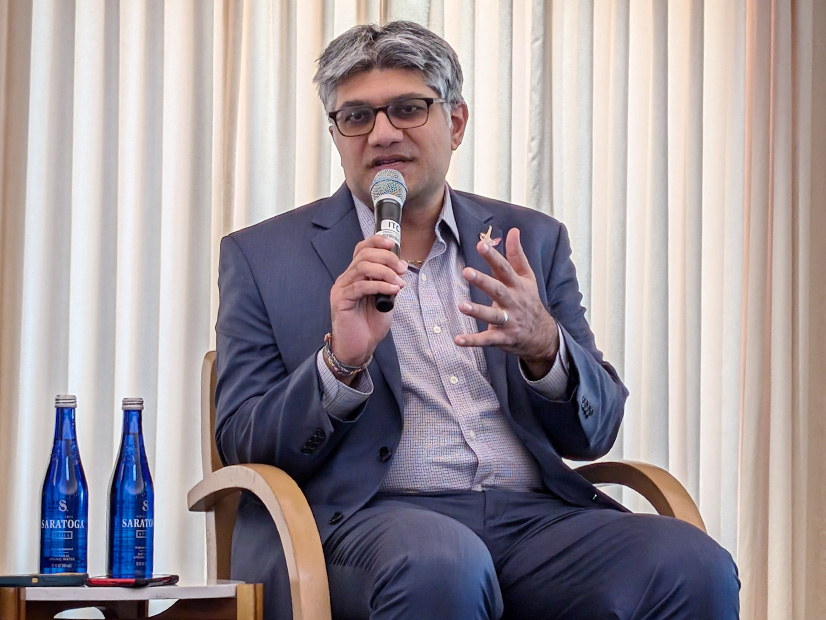
WASHINGTON ― President-elect Donald Trump’s November victory has not slowed the number of new loan applications coming into the Department of Energy’s Loan Programs Office, according to LPO Director Jigar Shah.
The LPO has 212 active applications seeking $324.3 billion in federal dollars, Shah said during his Dec. 12 appearance at the U.S. Energy Association’s Advanced Energy Technology Showcase at the Ronald Reagan Building. The office continues to receive “an average of one application a week,” he said. “The latest monthly application activity report went up by $20 billion this last month. And so, it’s also been a surprise to me, but there’s been a lot of new applications that continue to come in.”
What’s driving the ongoing activity is artificial intelligence and load growth and the need to maintain U.S. leadership in energy innovation and rebuilding domestic supply chains, he said.
“We need to allow all these manufacturing facilities and onshoring and reshoring facilities to interconnect to the grid. [This] remains a priority, right?” Shah said. “AI, load growth remains a priority. We want to win AI, right? The technologies that we’re covering, everything from nuclear power to enhanced geothermal to next-generation grid technology to virtual power plants are all essential to meeting this moment. All of it, right?”
Shah’s four years at LPO have been dedicated to making the office a “bridge to bankability” for clean tech entrepreneurs, which in many cases has meant mentoring early stage companies to the point where they can apply for a loan, he said.
Trump’s pronouncements on energy policy since the election have focused on U.S. energy dominance and independence, goals Shah argues will make energy innovation and entrepreneurship critical.
According to its most recent report, the office still has close to $400 billion in unspent loan authority, and Shah said the LPO provides essential financing to “the most exciting entrepreneurs and innovators that America has to offer. I think they’re irresistible. I think folks are going to want us to continue to do big things.”
Pointing to technologies that have bipartisan support, he said, “if you’re going to scale up nuclear power, if you’re going to scale up clean hydrogen, if you’re going to scale up these technologies, there’s no other place to get affordable debt to do these first-time projects outside the Loan Programs Office.”
Shah said Trump has yet to name a transition team for DOE, so he has not been able to talk with anyone from the incoming staff of Chris Wright, the CEO of Liberty Energy, a natural gas company, whom Trump has nominated to head the department. But Shah said his first step will be to introduce the transition team to the team of investment professionals and energy experts he has assembled at LPO.
“We’ve built a world-class team, and this world-class team wants to put this money out the door to help American entrepreneurs and innovators to meet the moment,” he said.
DOE and the LPO still face a range of unknowns, such as whether they might fall victim to the staff-cutting agenda of Elon Musk and Vivek Ramaswamy’s Department of Government Efficiency.
Shah again remains confident. “When you look at the Loan Programs Office today, for the amount of debt that we’re putting out the door, the private sector would have three times the number of employees that we would have,” he said. “So, I think we’re probably a hallmark of government efficiency in terms of the way in which we’ve processed the loans, the way in which we’ve substantially reduced the time that it takes to get a loan.”
Another strong selling point is “how much private-sector capital we’ve crowded in,” Shah said. “When you get a conditional payment from the loan programs office, every single one of our applicants has been able to successfully raise equity, which is not easy these days, right? … I think that the Loan Programs Office is government doing its job well.”
Shah also said companies that have either received a conditional loan or finalized a contract should be safe from any clawback efforts. Conditional commitments are binding contracts, he said.
“I think all of these projects are important to the communities that they’re in; they’re important to the states that they’re in; they’re important to the congressional districts they’re in,” Shah said.
“I don’t know how many entrepreneurs and innovators you’ve met, but they are ferocious,” he said. “They will walk through walls to accomplish their goals. If they cannot build them here, they will go to another country to build them. I don’t know why anyone would want these entrepreneurs and innovators to leave our country and go to another country to commercialize American technology, because we make a mistake. All the R&D, all the invention was done here. Why would people not want them to scale them here?”



